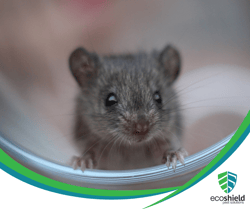Imagine this: a pristine home, meticulously maintained, with gleaming countertops and floors that practically sparkle. On the surface, it's the embodiment of cleanliness and order. But lurking beneath the tidiness, an age-old question emerges: Can even the most immaculate homes fall victim to the invasion of mice? The idea of rodents infesting a spotless sanctuary might seem contradictory, but the reality might surprise you. In this blog, we delve into the often misunderstood relationship between cleanliness and mouse infestations.
Why do mice come indoors?
When discussing infestations, it’s important to understand why mice enter homes to begin with. Mice are tiny, agile creatures with a keen sense of survival. They will often find their way into homes for a variety of reasons. One of the primary drivers for their intrusion is the quest for shelter. As the weather turns colder or wetter, mice instinctively seek refuge in warmer environments, and human homes with their cozy nooks and crannies provide the perfect escape from the harsh elements. The warmth and protection offered by the walls, attics, and basements of homes make them attractive nesting sites for these rodents.
Another compelling reason for mice to enter homes is the pursuit of food. Mice are opportunistic omnivores, and human dwellings are treasure troves of delectable morsels. From unsealed food containers to crumbs scattered on the kitchen floor, these resourceful creatures can thrive on the edible abundance unknowingly left behind by homeowners. The scent of food acts as a beacon, luring mice indoors and driving them to explore every crevice in their search for their next meal.
The reproduction and nesting habits of mice also play a crucial role in their decision to enter homes. Mice have relatively short gestation periods and can produce numerous offspring in a short span of time. Seeking safe havens for breeding and raising their young, mice can infiltrate homes to create a secluded, protected environment for their growing families. Attics, wall voids, and even neglected corners become ideal nurseries, allowing them to multiply rapidly within the confines of human homes.
Structural vulnerabilities in homes present yet another opportunity for mice to gain access. Even the tiniest cracks and gaps in a building's exterior can serve as convenient entry points for these agile rodents. Mice can squeeze through openings as small as a quarter of an inch, taking advantage of loose weather stripping, damaged vents, or gaps around utility lines. Once they've established an entry route, they can infiltrate homes with ease, raising the risk of infestations if left unaddressed.
Human activity inadvertently contributes to the dynamic. Landscaping choices, such as piled firewood or overgrown vegetation close to the home, can create enticing habitats for mice that eventually make their way indoors. Additionally, cluttered spaces within homes provide ample hiding spots, making it easier for mice to remain undetected and undisturbed as they move about.
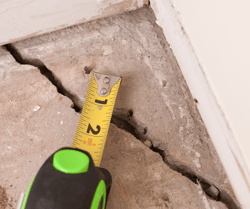 Mice can squeeze through openings as small as a quarter of an inch.
Mice can squeeze through openings as small as a quarter of an inch.
Are poorly maintained homes more attractive to mice?
Generally speaking, dirty and cluttered homes are more attractive to mice. Mice are opportunistic creatures that are constantly on the lookout for sources of food, water, and shelter. Poorly maintained homes provide them with a greater likelihood of these resources, making them more likely to establish a presence within such environments.
- Food Sources: A dirty home often means that food scraps and crumbs are left behind on countertops, floors, and in hard-to-reach corners. Mice have a keen sense of smell and can detect even the tiniest traces of food. A cluttered environment can make it difficult for homeowners to thoroughly clean up after meals, leaving behind a steady supply of food that mice can readily access.
- Water Availability: In addition to food, mice also need water to survive. Leaky pipes, dripping faucets, or even standing water in cluttered areas can provide a reliable water source for mice. A poorly maintained home with hidden water sources can sustain a mouse population and encourage them to stay.
- Shelter and Nesting Materials: Cluttered and disorganized spaces in a home offer numerous hiding spots and materials for mice to build their nests. Piles of clothing, stacks of paper, and other clutter provide ideal locations for mice to establish their nests and raise their young in safety.
- Difficult Detection: A cluttered home can make it harder for homeowners to notice the presence of mice. Mice are nocturnal and tend to stay hidden during the day. In an untidy environment, it's easier for them to move around unnoticed, making it challenging to identify an infestation until it becomes significant.
- Reduced Maintenance: Homeowners may inadvertently neglect cleaning and maintenance in cluttered spaces, which creates an environment that is ideal for mice. Regular cleaning and decluttering routines are essential not only for general hygiene but also for deterring pests like mice.
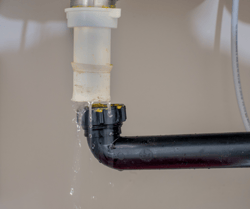 Leaky pipes, dripping faucets, or even standing water in cluttered areas can provide a reliable water source for mice.
Leaky pipes, dripping faucets, or even standing water in cluttered areas can provide a reliable water source for mice.
Are clean homes at risk of mice infestation?
While clean homes are generally considered to be at a lower risk of mice infestations compared to dirty and cluttered ones, they are not completely immune to the possibility. Mice are driven by the need for food, water, and shelter, and even the most well-maintained homes can offer access to these resources.
Mice are skilled at finding even the smallest sources of food. In a clean home, the presence of stored grains, dry pet food, or unsealed food containers can still attract mice. Even if you maintain a spotless kitchen, a small oversight like a piece of fruit left on the countertop or crumbs under an appliance can provide enough sustenance to entice mice. Because of their small size and efficient metabolism, mice can find a meal in sources that might go unnoticed by humans. A few crumbs on the floor, a bit of spilled pet food, or even minor kitchen scraps can be enough to support a mouse.
Water sources are another consideration. While a clean home is less likely to have leaky pipes or standing water, mice can still find water in unexpected places. Condensation around pipes, dripping faucets, or even pet water bowls that aren't emptied regularly can provide the moisture mice need to survive. It’s worth mentioning that a mouse requires as little as 2-4 milliliters of water per day to meet its hydration needs.
Furthermore, mice seek shelter in secure and protected areas. Clean homes with gaps in the foundation, broken vents, or unsealed entry points can still offer opportunities for mice to enter. Even a well-maintained home with a cluttered attic, basement, or crawl space can provide nesting sites for mice.
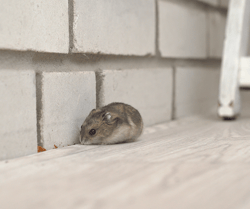 Mice are driven by the need for food, water, and shelter.
Mice are driven by the need for food, water, and shelter.
What may attract mice to a clean home over a dirtier one?
While mice are generally attracted to environments that are more consistent with poorly maintained homes, there are a few specific factors that might make a clean home more appealing to them than a dirtier one:
- Easy Access to Food: In a clean home, any leftover food or crumbs are likely to be more concentrated and accessible due to regular cleaning routines. Even a small amount of overlooked food can be enticing to mice. A clean home that occasionally has exposed food or improperly stored items can serve as an easy buffet for mice, drawing them in.
- Lack of Predators: A clean and well-maintained home might have fewer natural predators of mice, such as spiders and other insects, which can be common in dirtier environments. The absence of these predators can make a clean home seem like a safer haven for mice to explore.
- Climatic Conditions: Mice might be attracted to a clean home because of the temperature and humidity control that cleanliness can offer. A clean and organized home might have fewer drafts, better insulation, and more consistent humidity levels, which can be appealing to mice seeking a comfortable shelter.
- Hiding Spaces: A clean home can sometimes have hidden nooks and crannies that provide mice with plenty of hiding spots. Mice are excellent at finding even the smallest crevices to nest in, and a clean home might offer a variety of such spaces that are less cluttered and more appealing for nesting.
- Reduced Competition: In a cleaner environment, there might be fewer competing pests or animals that could discourage mice from taking up residence. In dirtier environments, other pests like cockroaches might already be established, creating competition for resources. A cleaner home might offer mice a chance to dominate the available resources without as much competition.
It's important to remember that while a clean home might reduce some risk factors, mice can still be attracted to any environment that provides the essentials they need to survive. Mice are clever and opportunistic, meaning they aren’t particularly discerning when choosing a place to live. In this way, cleaner homes can be equally at risk of infestation of rodents, particularly mice.
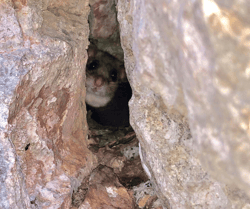 Mice are excellent at finding even the smallest crevices to nest in.
Mice are excellent at finding even the smallest crevices to nest in.
How can I prevent a mouse infestation in my clean home?
Preventing a mouse infestation in a clean home requires a combination of proactive measures to eliminate the factors that attract mice and to block their potential entry points. Here are some effective steps to take:
- Seal Entry Points: Mice can enter through very small openings, so inspect your home for any gaps, cracks, or holes in walls, floors, and foundation. Seal these entry points using materials like caulk, steel wool, or wire mesh to prevent mice from getting in.
- Keep Food Secure: Store food in airtight containers made of glass or metal, and avoid leaving pet food out overnight. Regularly clean up crumbs and spills, and make sure your kitchen and dining areas are well-maintained.
- Limit Water Sources: Fix any leaky pipes, faucets, or plumbing issues promptly. Wipe down countertops and surfaces to remove excess moisture, and ensure that pet water bowls are emptied and refilled regularly.
- Maintain Cleanliness: Simple adjustments to cleaning routines can help deter mice by targeting areas that mice tend to spend their time. Pay attention to areas under appliances, in cabinets, and along baseboards.
- Declutter Responsibly: While a clean and organized home is beneficial, be mindful of clutter that could provide nesting sites. Store items off the floor and avoid accumulating piles of papers, cardboard, or fabrics.
- Landscaping: Trim vegetation away from the exterior of your home, as dense plants and overgrown shrubs can provide hiding spots for mice near potential entry points.
- Seal Trash Properly: Ensure that trash cans are tightly sealed and that outdoor trash bins are secure. Mice are attracted to trash, so preventing their access to it is crucial.
- Don't Forget the Garage: Garages can be hotspots for mice activity. Ensure grass seed and bird seed are stored in airtight containers, avoid storing excess pantry items in the garage when possible, and keep garbage cans covered if stored indoors.
- Regular Inspection: Periodically inspect your home for signs of mice, such as droppings, gnaw marks, or nesting materials. Early detection can help you take action before an infestation takes hold.
- Secure Doors and Windows: Install door sweeps on exterior doors and ensure that windows are properly screened to prevent mice from entering.
- Professional Pest Control: If you're concerned about mice or have spotted signs of their presence, consider consulting with a professional pest control service like EcoShield Pest Solutions. We can provide effective solutions and recommendations tailored to your specific situation.
Remember that mice are persistent and resourceful creatures, so it's important to be diligent in your prevention efforts. By addressing potential attractants and entry points, you can greatly reduce the risk of a mouse infestation in your clean home.
 Keep vegetation away from the exterior of your home to prevent mice.
Keep vegetation away from the exterior of your home to prevent mice.
Can EcoShield Pest Solutions help prevent or remove mice from my home?
Yes! At EcoShield, we believe prevention is the single best first-line of defense against rodent infestations. That’s why four-season protection is included in our Home Shield Protection Plan, providing a year-round defense against mice infestations. Have a current infestation? Not to worry! EcoShield offers guaranteed exclusion services that will rid your home of unwanted rodents now and forever with annual renewal. If you want to prevent or remove mice from your home, give EcoShield a call or fill out the form on this page today to get started.
